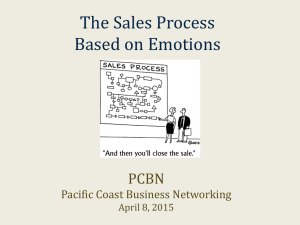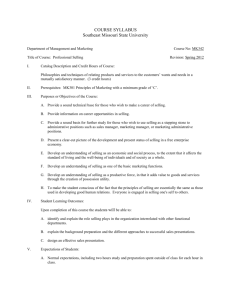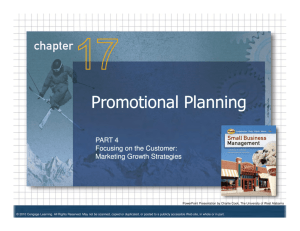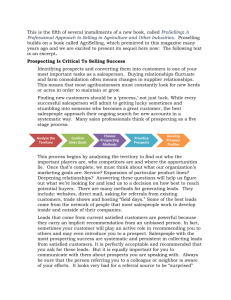MKTG-360 - University of Nicosia
advertisement
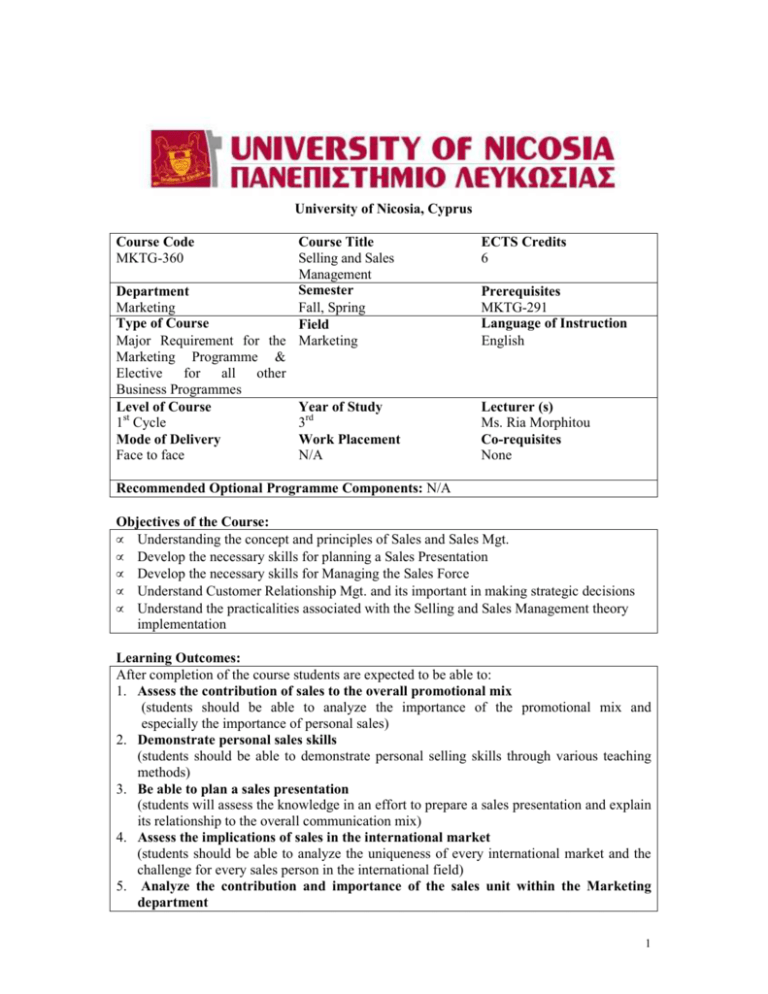
University of Nicosia, Cyprus Course Code MKTG-360 Course Title Selling and Sales Management Semester Department Marketing Fall, Spring Type of Course Field Major Requirement for the Marketing Marketing Programme & Elective for all other Business Programmes Level of Course Year of Study st 1 Cycle 3rd Mode of Delivery Work Placement Face to face N/A ECTS Credits 6 Prerequisites MKTG-291 Language of Instruction English Lecturer (s) Ms. Ria Morphitou Co-requisites None Recommended Optional Programme Components: N/A Objectives of the Course: • Understanding the concept and principles of Sales and Sales Mgt. • Develop the necessary skills for planning a Sales Presentation • Develop the necessary skills for Managing the Sales Force • Understand Customer Relationship Mgt. and its important in making strategic decisions • Understand the practicalities associated with the Selling and Sales Management theory implementation Learning Outcomes: After completion of the course students are expected to be able to: 1. Assess the contribution of sales to the overall promotional mix (students should be able to analyze the importance of the promotional mix and especially the importance of personal sales) 2. Demonstrate personal sales skills (students should be able to demonstrate personal selling skills through various teaching methods) 3. Be able to plan a sales presentation (students will assess the knowledge in an effort to prepare a sales presentation and explain its relationship to the overall communication mix) 4. Assess the implications of sales in the international market (students should be able to analyze the uniqueness of every international market and the challenge for every sales person in the international field) 5. Analyze the contribution and importance of the sales unit within the Marketing department 1 (students should be able to analyze the importance of the various activities in IMC and how Personal Sales affects its success) 6. Be able to prepare an effective sales department (students should develop the skills to organize and manage a sales force) 7. Be able to recruit, motivate, and train the sales force (students must illustrate that managing a force team requires the knowledge to recruit, motivate and train its employees for sales success) 8. Design a compensation and evaluation plan (students must revise the necessary knowledge of the evaluation and compensation methods for the sales force which should be incorporated in the overall HR strategy of the department Course Contents: 1. The sales perspective: Sales and Selling management is often a very complex process, involving the use of a whole set of principles, techniques and substantial personal skills 2. Sales strategies and techniques: The planning process can be described through the acronym MOST which describes the process from the general to the specific: mission, objective, strategy and tactics 3. The personal selling process: The degree to which salespeople practice the marketing concept by trying to help their customers make purchasing decisions that will satisfy their needs 4. Preparation: prospecting and approaching: Half of the success of a sales presentation is doing your research and getting ready for it. Prospecting is the process of finding new customers. 5. Presentation and handling objections: A sales person must be able to produce a sales presentation that will eventually influence the consumer to buy. Part of this presentation is handling possible consumer objections. 6. Closing, confirming and after-sale follow-up: The last and most important part of the sales presentation is the closing. This is the stage where 7. Relationship selling: Building a relationship with the customer by offering quality products and services through innovation 8. Retail and e-store selling: Developments in information technology have improved communication between salespeople and customers. On the other hand however, e-selling has affected retail sales and changed consumer purchasing behaviour 9. Managing the sales force: A major challenge for a sales manager is to direct and coordinate a number of creative people. That incorporates however the recruitment, training, motivation, compensation and evaluation of the sales force. Learning Activities and Teaching Methods: Lectures, Presentations, Practical Exercises and Assignments. Assessment Methods: Homework, Project, Mid-Term, Final Exam. Required Textbooks/Reading: Authors Title Jobber, David and Selling & Sales Lancaster, Geoffrey Management Publisher Prentice-Hall, 7th edition Year 2007 ISBN 0-07-226215X Recommended Textbooks/Reading: Authors Title Publisher Year ISBN 2 Charles Futrell Fundamentals of Selling McGraw Hill, 11th Edition 2009 13978000733811 21 3
